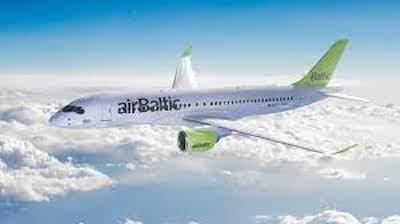
Latvia-based AirBaltic says a shortage of spare engines “significantly impacted” its second quarter (Q2) performance even though it returned to profitability for the first half of the year.
“When we look back at the first six months of 2022 and even 2019, we have seen a significant growth to achieve the historically highest profit, record-breaking revenue, and an overall increase in the number of people flying with us,” CEO Martin Gauss said. “However, the shortage of spare engines ... significantly impacted our performance in Q2. That delayed even greater improvement in total results.”
Gauss said the airline was forced to wet-lease aircraft to mitigate the loss in capacity. “Despite these obstacles, AirBaltic’s commercial performance was strong,” he said.
The airline operates 42 Pratt & Whitney PW1500G GTF-powered Airbus A220-300s but has faced supply-chain delays in servicing those engines in recent months. The situation has led to tensions with the manufacturer, with Gauss saying in May: “I’m a very patient and calm person, until it comes to the subject of Pratt & Whitney.” The shortage of spare engines led to an average of 11 grounded aircraft in airBaltic’s A220 fleet for the June quarter.
At the beginning of July, the airline received a €20.4 million ($22.44 million) commercial-support payment related to the engine shortage in Q2, improving its cash balance. AirBaltic said the support was extended to it in line with a signed agreement between airBaltic and Pratt & Whitney in June to address the engine shortage’s effect on the airline’s liquidity.
AirBaltic posted net income of €14.6 million for the first half (H1) of 2023, reversing its net loss of €91 million for the same period in 2022. The carrier achieved its highest-ever revenue for the first half of a year, at €291 million, up 52% over H1 2022 and a 33% improvement over H1 2019.
AirBaltic carried close to 2 million passengers during H1 2023, 52% more than the same period last year. July marked the first time since 2019—and only the fifth time in the history of the airline—that more than 500,000 passengers were carried in a month. AirBaltic plans to add two more aircraft in August and have a fleet of 50 by year-end.





